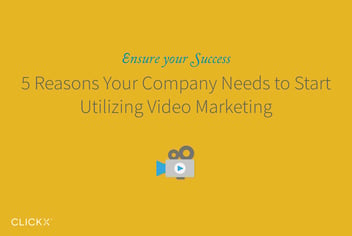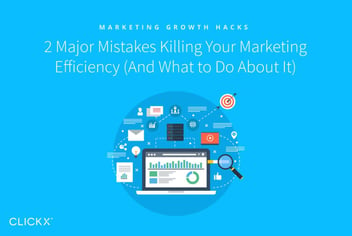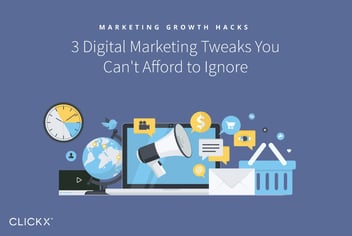7 Online Marketing Mistakes That Could Cost Your Business a Small Fortune
If you search for ‘online marketing tips’ in Google, you’ll find over 250 million results. The majority of these will be explaining the things that your business should be doing.
However, what many business owners don’t know is that these articles are often written by people who have never even attempted the tips they are recommending. They could be recommending that you spend thousands of dollars each month on paid advertising, but not telling you how to do so effectively. Or they could be teaching you how to focus on attracting new customers, rather than retaining your current ones.
With all of the information online today, how can you know for sure what you should and shouldn’t be doing? In this article, we’ll discuss some of the most common online marketing mistakes, and explain what you actually should be doing.

1. Failing to Self Promote
[Tweet “The biggest online marketing mistake you could be making is not marketing at all.”]
Yes, you heard that right! Failing to promote your business at any given opportunity could be costing your business money.
Many business owners believe they have such a great product or service that it will be learned about naturally over time. Unfortunately, unless you are famous, or have a lot of connections, this will not be the case. Being afraid to promote won’t get you anywhere, so make sure to get your name out there! The more you market your business, the more money you will make. It’s that simple.
2. Having Messy Goals
It’s all well and good knowing that you want to attract new customers, but do you have any specific goals on what you want to achieve?
Perhaps you want to attract a certain number of visitors to your website, achieve a certain conversion rate, or even receive a certain number of social media followers or shares. Many articles will tell you the ways to improve your business, but unless you have clear goals, you will not be able to track the results in an efficient manner. This will inevitably leave you feeling disappointed.
Before embarking on a marketing campaign, make note of your budget, and work out what you want to achieve. Having messy goals could leave you spreading yourself too thin, and thus wasting money that you might not have needed to spend.
3. Thinking Your Conversion Rate Doesn’t Matter
Your website’s conversion rate is vital in determining how successful your on-site campaigns are.
Let’s say, for example, that you are selling a new range of hair products. Your online marketing campaigns are getting people to visit your site, but once they land there, they’re not converting into sales. Why is this? Is it because you are not marketing to the right demographic? Is it because your website is poor and needs a good overhaul? Or is it because of your product?
As you tweak each element, you can keep an eye on your conversion rate to see if it improves. This will tell you whether your campaign is working or not, thus helping you to save money on marketing avenues that aren’t working.
4. Believing On-Site Blogs Are a Waste of Time
There has been a lot of discussion on the internet over the last few years concerning whether blogs are important or not. However, when you consider blogs from an online marketing standpoint, you will find that you have nothing to lose and everything to gain. By placing a blog on your site, and including relevant information about your product, service or industry, you are giving your site’s visitors value.
You don’t even need to add a lot of blog posts; at least, not at first. Just a few will help to improve your site’s Search Engine Optimization (SEO) and engage your customers. And better yet, if you do decide to place a pure marketing post on your blog, your readers will be more inclined to read what you have to say, especially if you have provided them with relevant information in the past.
Blogs are important, and while blogging may not be the most effective short term marketing strategy, you’ll find that spending wisely in this area can lead to great benefits down the line.
5. Not Understanding Cost Per Acquisition (CPA)
When performing an online marketing campaign, it is absolutely vital that your results are measurable.
Why? Well, if you can’t measure your results, how do you know what is and isn’t working? Your CPA is the quintessential metric for determining the true return on any investment you make. It doesn’t matter how many times your campaign is viewed or clicked on, if it isn’t making money, it’s not successful.
Many people (and articles!) confuse CPA rates with conversion rates, but they really are completely different. Conversion rates can be used to describe anything from someone liking a page on Facebook to someone making a purchase. Conversely, CPA is all about making someone a customer.
In order to run your marketing campaign effectively, you need to work out how much your average customer spends. This should give you an idea of how much you need to be spending to attract new customers. Doing anything else would mean throwing money away in the hope that you see sales – you likely will, but you’ll waste a lot of money in the process.
6. Thinking That Customer Acquisition is More Important Than Retention
Many articles will give you lots of hints and tips on how to attract new customers, but they won’t explain the importance of keeping the ones you already have. And while it is important to continually market your business to potential customers, it’s generally a lot cheaper to encourage current customers to buy from you again than attract new ones:

According to the above infographic (courtesy of Chargebee), it costs five times more money to acquire a new customer as it does to satisfy those you already have. And depending on the industry, improving your customer retention rate by just 5% can increase profits by as much as 125%.
7. Not Pricing Long Term Advertisements Correctly
Everyone is used to the traditional model of online advertising. You pay a certain amount for a specified number of clicks or impressions, and you can tailor make your ads to meet your business’ needs.
However, long term advertisements are not as cut and dry. Besides the initial impression, long term advertisements have additional benefits, and as such, are priced differently.
Although there is no hard and fast rule on how to price your long term advertisements, it’s recommended that you look at it with total media value in mind. Try and put a price tag on each action or piece of media, such as $10 on an organic visit achieved by a piece of SEO content, or $5 on a Facebook share. By calculating the total media value, you will be able to work out whether the money you are spending will be put to good use.
Conclusion
Online marketing doesn’t have to be expensive.
However, a lot of businesses think that by ploughing tons of cash into a campaign, they are increasing their chances of success. Instead, by focusing on improving your advertisements, retaining your customers, and having clear goals, you can make your advertising budget go much further, thus saving your business money while making more money.
Have you encountered any of these mistakes, or do you have any other tips that could help a business save money on their online marketing efforts? Let us know in the comments.



